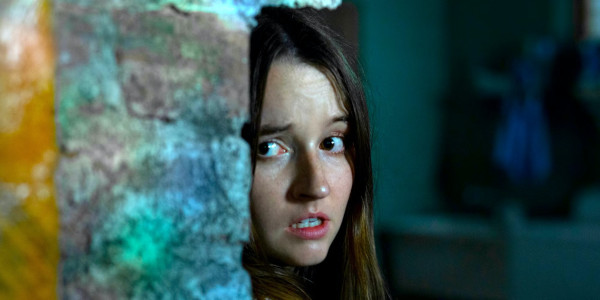
It feels like 2020 all over again with streamers releasing decent movies day-and-date on their platforms rather than theatrically. Netflix just dropped Reptile: a cool title for a boilerplate but serviceable cop procedural with shades of Fincher starring Benicio Del Toro, Justin Timberlake and Alicia Silverstone. And Hulu just released a little genre gem called No One Will Save You.
Writer/director Brian Duffield has been cutting his teeth on fun genre fare for the better part of a decade, and with No One Will Save You he combines his love of creature features and silent films, shooting for the moon while just missing the mark.
Kaitlyn Dever (Booksmart, Justified) is the mostly silent protagonist, Brynn. A shut-in living alone in her family house after the death of her mother, Brynn is a pariah in her town because of a mysterious tragedy from her past that involved her and her best friend, Maude. Duffield and Dever communicate all of this through deft visual storytelling: a trip to her mother’s grave, the townsfolk refusing to return a wave, Brynn’s nervous attempts at self-assurance in the rearview mirror. It’s simple and it’s effective.
And at just 90 minutes, NOWSY wastes no time getting to the action. Brynn hears noises in the night and quickly discovers that she is not alone. (Stop reading if you’re interested, because we’re venturing into spoiler territory for the rest of the review.) Not only is Brynn not alone but, as it turns out, we are not alone, in the universal sense.
The first act is classic horror, just in time for spooky season. The “there’s someone or something in the house” trope is a cliché for a reason, and Brynn’s bout with the shadowy grey figure is handled with a veteran’s touch despite this only being Duffield’s second feature.
As the film goes on, the creature creativity ramps up, leading to many moments where I literally said aloud, “What the hell is that?” Unfortunately, this also works against the artistic choice that Duffield makes of having little to no dialogue in the entire movie. What worked so well in the first act becomes less and less effective as I hear myself saying “What is that?!” while the main character merely sighs and screams her way through the film. Maybe I just talk to myself more than most people.
On top of that, as can often be the case with horror, the allegory for the main character’s past trauma and the resolution to the horrific event unfolding get mixed and muddled into an ending that doesn’t fully satisfy either aspect. After what I thought was the ending, another coda was tacked on that either resolved something that should have remained ambiguous or created a new ambiguity that now required another coda to resolve, which winds up taking the wind out of the sails of what is actually quite a devilish conclusion.
Regardless, Dever carries the entire film on her shoulders wonderfully and Duffield shows he’s an exciting young director with big ideas that he is (mostly) capable of pulling off. Just because this one didn’t fully land for me doesn’t mean I don’t appreciate the attempt.













